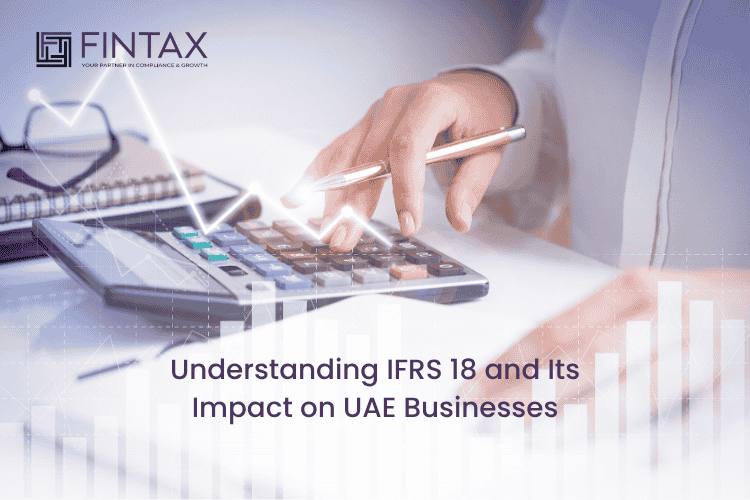Understanding IFRS 18 and Its Impact on UAE Businesses
German FinTax
June 26, 2025

As global financial reporting standards evolve, it’s essential for businesses operating internationally, including those in the United Arab Emirates (UAE), to stay up to date with the latest developments. A key development is the introduction of IFRS 18 – Presentation and Disclosure in Financial Statements, issued by the International Accounting Standards Board (IASB) in April 2024. IFRS 18 will replace IAS 1 Presentation of Financial Statements and come into effect for annual reporting periods starting on or after 1 January 2027.
What is IFRS 18 UAE?
IFRS 18 is a newly issued International Financial Reporting Standard that addresses how entities present and disclose financial information in their financial statements. The main objective is to enhance financial reports’ comparability, transparency, and usefulness for investors and stakeholders. It is particularly relevant for publicly listed companies and those operating internationally, such as in the UAE, where international standards are widely adopted.
Why Was IFRS 18 Introduced?
- One of the main criticisms of IAS 1 was the inconsistency in how companies presented their profit or loss statements. Investors struggled to compare performance across companies due to differing formats and non-standard metrics such as “adjusted earnings” or “underlying profit.” IFRS 18 tackles this by:
- Establishing three required categories in the profit or loss statement
- Requiring consistent classification and presentation
- Improving disclosure of management-defined performance measures (MPMs)
Key Changes Introduced by IFRS 18
1. Structured Income Statement
IFRS advisory services in UAE brings in a standardised structure for the statement of profit or loss, divided into three categories:
- Operating: Covers income and expenses from main business activities.
- Investing: Records returns from investments not part of core operations.
- Financing: Includes interest expenses and similar costs.
This new format brings clarity and helps stakeholders better understand how a business makes its profits.
2. Management-Defined Performance Measures (MPMs)
MPMs are performance metrics set by management that may not match IFRS totals (e.g., adjusted EBITDA, core earnings). Under IFRS 18, companies are now required to:
- Disclose these MPMs in a single note to the financial statements
- Explain how they’re calculated
- Reconcile them to the most comparable IFRS-defined measure
This increases transparency and trustworthiness, particularly for investors.
3. Enhanced Disaggregation
IFRS 18 stresses the need for clearer breakdowns of financial information, requiring items in financial statements to be divided into distinct, meaningful parts. This enables users of financial statements to gain a more detailed understanding of financial performance.
Implications of IFRS 18 for businesses in UAE
1. Preparation for Change
Although IFRS 18 isn’t effective until 2027, early preparation is advisable. UAE-based companies that report under IFRS — including many listed on the Dubai Financial Market (DFM) and Abu Dhabi Securities Exchange (ADX) — should begin assessing the impact on their reporting systems and disclosures.
2. Training and System Upgrades
Finance teams need training to grasp the new categories and requirements. The software and ERP systems used for financial reporting may also require updates to support the structured format and new disclosures.
3. Investor Communication
Publicly listed companies and large businesses should think about how these changes will impact investors’ perceptions of their financial performance. Communicating proactively and explaining MPMs clearly will be crucial for maintaining investor confidence.
Benefits of IFRS 18
For UAE businesses, particularly those dealing with global investors or operating internationally, IFRS 18 offers several advantages:
- Improved comparability with international peers
- Greater transparency in performance reporting
- More consistent communication of financial results
- Stronger investor confidence due to clearer disclosures
Why Choose German FinTax Consultancy?
Navigating the complexities of new financial reporting standards like IFRS 18 can be challenging, especially for businesses in the UAE that want to maintain compliance while focusing on growth. That’s where German FinTax Consultancy comes in.
At German FinTax, we specialise in providing expert accounting, audit, and advisory services tailored to businesses in the UAE. Our experienced professionals stay ahead of regulatory changes to help your organisation adapt swiftly and effectively.
Partner with German FinTax Consultancy to stay ahead of evolving standards and ensure your financial reporting is compliant, transparent, and investor-ready.
Categories
Any Question?
About German FinTax
German FinTax Consultancy offers expert solutions in taxation, accounting, and compliance to individuals and businesses across the UAE.
- Dubai, United Arab Emirates
- info@germanfintaxconsultancy.com
- +971 50 667 0856
Quick Links
Copyright © 2025 German FinTax Consultancy. All rights reserved
